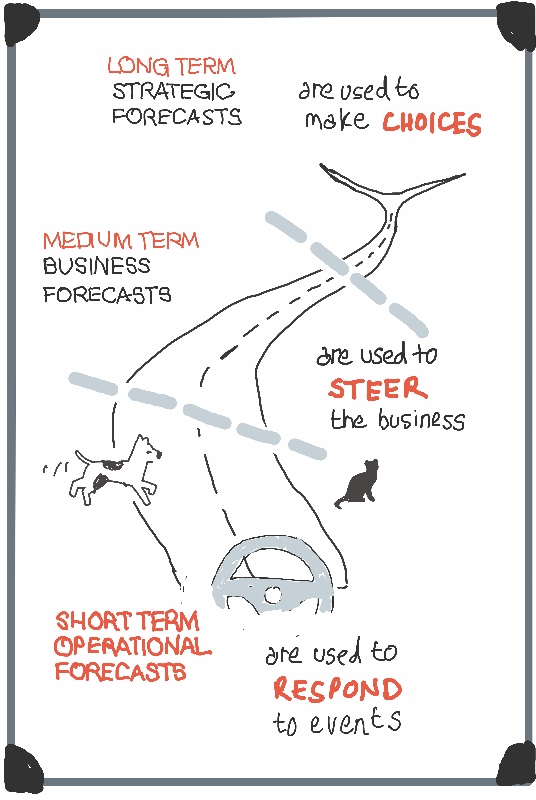 Note: Following is an eight-part serialization of selected content from Steve Morlidge's The Little (Illustrated) Book of Operational Forecasting.
Note: Following is an eight-part serialization of selected content from Steve Morlidge's The Little (Illustrated) Book of Operational Forecasting.
Different kinds of forecasts
This book is focused on operational forecasting – the stuff you do to determine what you need to buy, produce, hold in stock or otherwise give your customers what they need.
This differs from other kinds of forecasting that you might do in your business.
Long term forecasting may be needed to help an organization make strategic choices about where and what to invest in. This kind of forecasts help organizations to ADAPT.
In the medium-term business forecasts to help STEER the business by helping to manage the allocation of resources in order to deliver business performance.
Operational forecasts help businesses RESPOND to demand in the short term, and because the purpose of operational forecasting differs from medium and long terms forecasting, the process tends to be different as well.
In particular operational forecasts are done in greater detail. Since your customers want to buy a particular kind of say, shoe, in a particular size and colour, producing a forecast for shoes in general won’t help you provide good customer service.
Also, most businesses (at least the ones that survive) respond to demand reasonably quickly, so operational forecasts need to be refreshed very frequently.
In summary, operational forecasts are short term, very detailed and frequently refreshed and used to help businesses respond effectively and efficiently to customer demand. Because operational forecasting is a high volume, variety and velocity process it tends to be more reliant on automated mathematical processes than other kinds of forecasts.
TAKEOUT
Don’t get operational forecasts confused with other kinds of forecasts which have different purposes and processes. Operational forecasts are short term, detailed and used to help businesses respond to changes in demand.
Coming Next: The quality of forecasts matter…a lot
People often focus too much on the techniques and methodology and lose sight of the purpose of operational forecasting and the enormous business benefits to be gained by forecasting more effectively. This lesson lays out the investment case for forecasting and the argument for it being recognized as a key business process.

